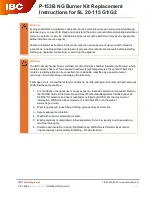
1-15
INSTALLATION
VFC 15-150, VFC 45-225 MODULATING GAS BOILERS
1.5.1.1 WITH SCHEDULE 40 PLASTIC VENTING SYSTEMS
(E.G. ULC-S636 CPVC)
A condensate trap must be installed near the base of the boiler as shown in
Figure
14
. The trap is formed using PVC pipe, elbows and threaded union fittings.
NOTE:
for CPVC vent systems, the connecting tee and bushing should be
formed using CPVC, transitioning to PVC in the wetted section of the trap, where
non-ULC-S636 materials are allowed as this section is not in contact with flue
products. The trap must be installed as follows:
•
The trap depth must be 6” min. in height (see
Figure 14
); with the
conventional vent kit parts supplied with the boiler, approximately 15”
clearance below the boiler is required.
•
Use the supplied vent kit parts to establish the trap in the location shown
below.
Do not place the drain connection tee directly at the base of the boiler.
1.5.1.2 WITH PPS VENTING SYSTEMS
For connection to PPS venting systems, an IBC VFC PPs transition kit is
required; select the kit corresponding to the brand of PPs venting to be used
at the installation site (see page 1-5). Note this kit is needed to make safe
connection to the boiler’s 2” NPT-M threaded exhaust outlet and to provide for
good drainage from both the boiler and from the external venting run. Ensure
metal retaining clips are applied at each PPs joint in the system, including that
between PPs and the stainless steel coupler, immediately below the boiler flue
outlet. The condensate trap itself is to be installed at the drain outlet provided at
the bottom of the PPs transition fitting, as shown in Figure 17.
Figure 14: Condensate trap configuration
Figure 16: Condensate trap
disassembly for cleaning
Figure 15: Condensate trap
configuration (double union option
shown)
Summary of Contents for VFC 15-150
Page 74: ...SERVICE RECORD DATE LICENSED CONTRACTOR DESCRIPTION OF WORK DONE...
Page 75: ...NOTES...
Page 76: ...NOTES...
Page 77: ...NOTES...
















































